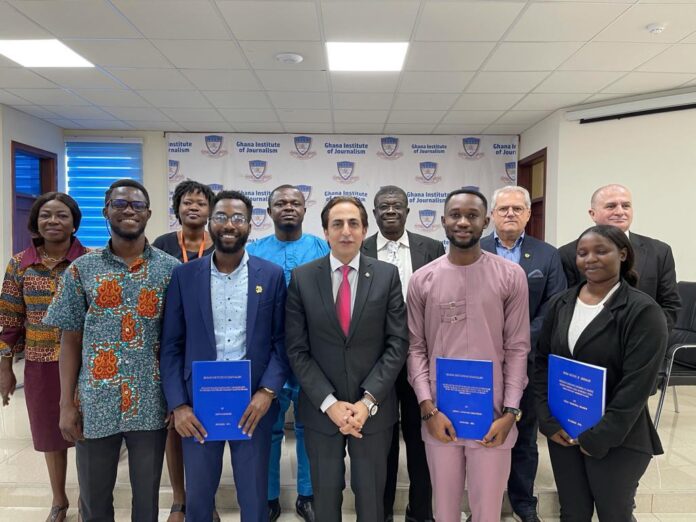The Ambassador of Lebanon to Ghana H.E Mr. Maher Kheir has called on journalists to invest in research as it has the potential to further Ghana’s cultural cooperation agenda with other nations.
According to him, the world has become a global village with countries closely linked.
This interconnectedness, therefore, required that journalists and media organizations have ample information about other countries in order to situate global events within their proper context to aid development.
He made the call at the maiden edition of the GIJ-Lebanese Community Research Seminar for post-graduate students at the Institute.
The seminar is an initiative of the Lebanese Embassy under the auspices of Ambassador H.E. Mr. Maher Kheir.
It will among other things equip beneficiaries of the Lebanese Community Scholarship program with research-based knowledge about other countries such as Lebanon to boost bilateral and cultural cooperation.
At the event, some of the students presented research papers on Ghanaian-Lebanese topics bothering on education, economy, health, tourism among others.
The research as well as its findings will be published to add to the body of knowledge and guide policy direction in respective sectors in the future.
Lebanese Ambassador H.E Mr. Maher Kheir lauded the students for their efforts and openness to learn more about Lebanese culture.
”I believe that the experience has been educative and helpful to you all. Your recent graduation and academic success proves it. This exposure to other cultures is the key to discovering more about the world” he said.
He also noted that journalists needed this panoramic view of the world to build bridges that bring people together.
“As the world becomes a global village, nations and people continue to be interconnected through culture. This cultural co-operation is necessary especially for you journalists to appreciate events from other people’s perspective without bias. This ethic is will help you become much more professional in your line of work while removing barriers that divide people.
He stressed that Lebanese have been in Ghana for over a century and are an integral part of its social fabric but many Ghanaians seem to know little about them.
”As we share ideas here, you’ll be empowered with adequate information about Lebanon-Ghana relations and the role of the Lebanese Community in Ghana as well as explore ways to advance this historical relationship” he noted.
According to the Diplomat, the research seminar will be the gateway to build an organic relationship between Ghanaians and Lebanese. It will give students the opportunity to learn about Lebanese culture and vice versa.
The Dean of the Graduate School at the GIJ, Dr. Adu Bempah Brobbey said the seminar was a good inititative which would broaden the scope of students.
He assured that the Management of the institute remains committed to raising students who would become active contributors to society’s growth by offering solutions to needs.
“Today, I am very proud of all our students for the excellent presentations on the various topics they selected. The findings show that they have really discovered a lot about Lebanon which will help us draw lessons for the Ghanaian society” he stated.
The Coordinator of the scholarship program, Mr. Ashkaar Naaman noted that the Lebanese Community in Ghana is keen on deepening its relationship with Ghanaians through quality education.
He commended the students for a good research done and promised that the community will continue to support them to maximize their potentials.
Some of the students were awarded different prizes for their research including travel opportunities.
The Ghana Institute of Journalism (GIJ) is one of six (6) tertiary institutions covered under the Lebanese Community Scholarship Program since 2013.
Other schools include the school of law, school of performing arts and school of languages at the University of Ghana as well as the Ghana School of Law (Makola) and the faculty of law at the Kmwa Nkrumanh University of Science and Technology (KNUST).
















































